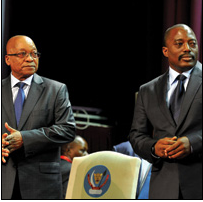International relations
South Africa and the Democratic Republic of Congo (DRC) are working together to generate clean energy from the Congo River.
 This follows the signing of the Grand Inga Treaty between President Jacob Zuma and DRC President Joseph Kabila to renew the Grand Inga Dam Project. The project has the potential to generate more than 41 000MW, which would be enough to supply electricity to half the African continent.
This follows the signing of the Grand Inga Treaty between President Jacob Zuma and DRC President Joseph Kabila to renew the Grand Inga Dam Project. The project has the potential to generate more than 41 000MW, which would be enough to supply electricity to half the African continent.
The treaty represents a practical commitment by the two countries to partner in developing this gigantic project that is expected to cost US$ 100 billion (R1 trillion).
“This agreement is significant since the Grand Inga Project has been in the pipe-line for a very long time. As South Africans, we are proud that we will be partnering with the people and the government of the DRC in the development of this project. The people of Congo deserve to celebrate this important milestone in their collective desire to develop and industrialise their country,” said President Zuma.
Land of opportunity
On the sidelines of the visit, a business delegation from South Africa attended a business forum with their Congolese counterparts. Among the South African companies represented at the forum were Vodacom, Standard Bank, Shoprite and Anglo Gold Ashanti.
According to the Department of International Relations and Cooperation (Dirco), President Zuma commended South African companies that had already invested in the DRC in the mining, telecommunications, financial services, road infrastructure, construction and hospitality sectors.
“Total South African investment in the DRC between 2006 and 2012 was estimated at R12.5 billion. Over 4 000 jobs were created from the investment projects,” said Dirco.
South Africa also contributed troops to the Intervention Brigade, which was mandated by the African Union and United Nations to confront armed groups in the eastern DRC. The brigade helped the DRC army defeat the main rebel group, M23, which has now signed a peace treaty with the government.
In their discussions, President Zuma and President Kabila expressed satisfaction with progress made in strengthening political and economic cooperation between the two countries.
Dirco said the two Presidents agreed to prioritise key areas of cooperation such as trade and investment, energy, infrastructure, agriculture, transport, science and technology, and security cooperation.
President Zuma also stressed the importance of intra-African trade.
“South Africa is looking to harness further opportunities by embarking on several projects that favour the promotion of value added products and services to the DRC and to give support to the DRC Government’s infrastructure and economic development initiatives,” he said.
President Zuma noted that economic growth in Africa and the DRC in particular, was expected to outpace that of developed countries.
“African growth rates will average six per cent in 2014. In comparison, growth in the developed world will average 3.6 per cent. The DRC is estimated to grow at 8.2 per cent in this year alone. Against this backdrop, any investor would be hard pressed to find higher rates of return elsewhere in the world. However intra-regional trade and sustained growth on the continent must be preceded by enabling technical and transport infrastructure,” he said.
President Zuma added that he was pleased with the outcome of the DRC visit.
“The outcomes of our discussions reaffirm our continued commitment and resolve to put our bilateral cooperation and partnership to higher levels,” he said.



 Facebook
Facebook Twitter
Twitter WhatsApp
WhatsApp